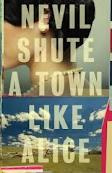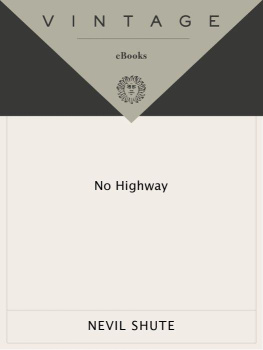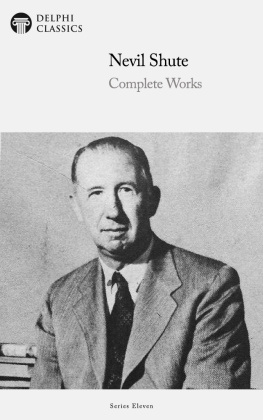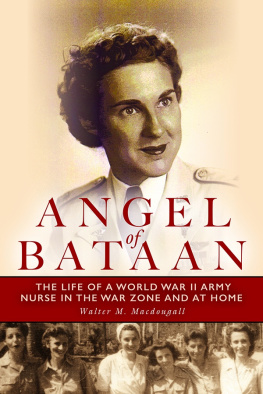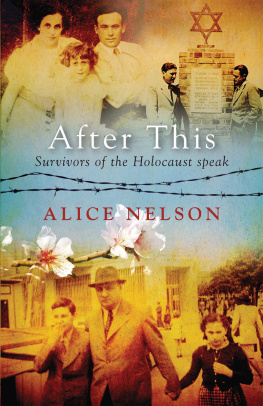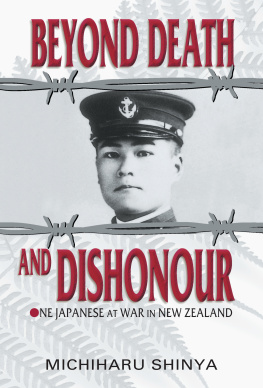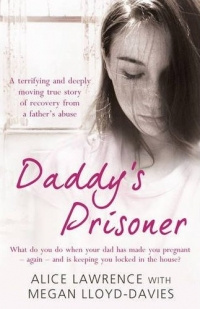Nevil Shute - A Town Like Alice
Here you can read online Nevil Shute - A Town Like Alice full text of the book (entire story) in english for free. Download pdf and epub, get meaning, cover and reviews about this ebook. year: 1987, publisher: Ballantine Books, genre: Humor. Description of the work, (preface) as well as reviews are available. Best literature library LitArk.com created for fans of good reading and offers a wide selection of genres:
Romance novel
Science fiction
Adventure
Detective
Science
History
Home and family
Prose
Art
Politics
Computer
Non-fiction
Religion
Business
Children
Humor
Choose a favorite category and find really read worthwhile books. Enjoy immersion in the world of imagination, feel the emotions of the characters or learn something new for yourself, make an fascinating discovery.
- Book:A Town Like Alice
- Author:
- Publisher:Ballantine Books
- Genre:
- Year:1987
- Rating:4 / 5
- Favourites:Add to favourites
- Your mark:
- 80
- 1
- 2
- 3
- 4
- 5
A Town Like Alice: summary, description and annotation
We offer to read an annotation, description, summary or preface (depends on what the author of the book "A Town Like Alice" wrote himself). If you haven't found the necessary information about the book — write in the comments, we will try to find it.
A Town Like Alice — read online for free the complete book (whole text) full work
Below is the text of the book, divided by pages. System saving the place of the last page read, allows you to conveniently read the book "A Town Like Alice" online for free, without having to search again every time where you left off. Put a bookmark, and you can go to the page where you finished reading at any time.
Font size:
Interval:
Bookmark:
It is reasonably certain that, if a book is to be read second-hand or even in pirated form, its author would prefer it to be read as he or she wrote it. Therefore, from respect for the author, the two thousand-odd errors wrought by 'program' incompatibility have been corrected. The author's original text has been retained, therefore the present English 'ise' verbal termination is seen as 'ize' and the abbreviation of 'I would' mostly as 'I'ld' etc. Mr. Shute was a very considerable author and story-teller, as this book shows, and he deserves to be read as he intended. - A publisher and fellow though lesser writer. Nov. '04.
Title: A Town Like Alice
Author: Nevil Shute
First Published: 1951
e-book: V1.1, 3 June 2001
A TOWN LIKE ALICE
NEVIL SHUTE
First published 1950 by Wm. Heinemann Ltd.
This edition published 1961 by Pan Books Ltd.
How many loved your moments of glad grace,
And loved your beauty with love false or true;
But one man loved the pilgrim soul in you,
And loved the sorrows of your changing face.
W. B. Yeats
James Macfadden died in March 1905 when he was forty-seven years old; he was riding in the Driffield Point-to-Point.
He left the bulk of his money to his son Douglas. The Macfaddens and the Dalhousies at that time lived in Perth, and Douglas was a school friend of Jock Dalhousie, who was a young man then, and had gone to London to become junior partner in a firm of solicitors in Chancery Lane, Owen, Dalhousie and Peters. I am now the senior partner, and Owen and Dalhousie and Peters have been dead for many years, but I never changed the name of the firm.
It was natural that Douglas Macfadden should put his affairs into the hands of Jock Dalhousie, and Mr Dalhousie handled them personally till he died in 1928. In splitting up the work I took Mr Macfadden on to my list of clients, and forgot about him in the pressure of other matters.
It was not until 1935 that any business for him came up. I had a letter from him then, from an address in Ayr. He said that his brother-in-law, Arthur Paget, had been killed in a motor car accident in Malaya and so he wanted to redraft his will to make a trust in favour of his sister Jean and her two children. I am sorry to say that I was so ignorant of this client that I did not even know he was unmarried and had no issue of his own. He finished up by saying that he was too unwell to travel down to London, and he suggested that perhaps a junior member of the firm might be sent up to see him and arrange the matter.
This fitted in with my arrangements fairly well, because when I got this letter I was just leaving for a fortnight's fishing holiday on Loch Shiel. I wrote and told him that I would visit him on my way south, and I put the file concerning his affairs in the bottom of my suitcase to study one evening during my vacation.
When I got to Ayr I took a room at the Station Hotel, because in our correspondence there had been no suggestion that he could put me up. I changed out of my plus-fours into a dark business suit, and went to call upon my client.
He did not live at all in the manner I had expected. I did not know much about his estate except that it was probably well over twenty thousand pounds, and I had expected to find my client living in a house with a servant or two. Instead, I discovered that he had a bedroom and a sitting-room on the same floor of a small private hotel just off the sea front. He was evidently leading the life of an invalid though he was hardly more than fifty years old at that time, ten years younger than I was myself. He was as frail as an old lady of eighty, and he had a peculiar grey look about him which didn't look at all good to me. All the windows of his sitting-room were shut and after the clean air of the lochs and moors I found his room stuffy and close; he had a number of budgerigars in cages in the window, and the smell of these birds made the room very unpleasant. It was clear from the furnishings that he had lived in that hotel and in that room for a good many years.
He told me something about his life as we discussed the will; he was quite affable, and pleased that I had been able to come to visit him myself. He seemed to be an educated man, though he spoke with a marked Scots accent. "I live very quietly, Mr Strachan," he said. "My health will not permit me to go far abroad. Whiles I get out upon the front on a fine day and sit for a time, and then again Maggiethat's the daughter of Mrs Doyle who keeps the houseMaggie wheels me out in the chair. They are very good to me here."
Turning to the matter of the will, he told me that he had no close relatives at all except his sister, Jean Paget. "Forbye my father might have left what you might call an indiscretion or two in Australia," he said. "I would not say that there might not be some of those about, though I have never met one, or corresponded. Jean told me once that my mother had been sore distressed. Women talk about these things, of course, and my father was a lusty type of man."
His sister Jean had been an officer in the WAACs in the 1914-18 War, and she had married a Captain Paget in the spring of 1917. "It was not a very usual sort of marriage," he said thoughtfully. "You must remember that my sister Jean had never been out of Scotland till she joined the army, and the greater part of her life had been spent in Perth. Arthur Paget was an Englishman from Southampton, in Hampshire. I have nothing against Arthur, but we had all naturally thought that Jean would have married a Scot. Still, I would not say but it has been a happy marriage, or as happy as most."
After the war was over Arthur Paget had got a job upon a rubber estate in Malaya somewhere near Taiping, and Jean, of course, went out there with him. From that time Douglas Macfadden had seen little of his sister; she had been home on leave in 1926 and again in 1932. She had two children, Donald born in 1918 and Jean born in 1921; these children had been left in England in 1932 to live with the Paget parents and to go to school in Southampton, while their mother returned to Malaya. My client had seen them only once, in 1932 when their mother brought them up to Scotland.
The present position was that Arthur Paget had been killed in a motor accident somewhere near Ipoh; he had been driving home at night from Kuala Lumpur and had driven off the road at a high speed and hit a tree. Probably he fell asleep. His widow, Jean Paget, was in England; she had come home a year or so before his death and she had taken a small house in Bassett just outside Southampton to make a home for the children and to be near their schools. It was a sensible arrangement, of course, but it seemed to me to be a pity that the brother and the sister could not have arranged to live nearer to each other. I fancy that my client regretted the distance that separated them, because he referred to it more than once.
He wanted to revise his will. His existing will was a very simple one, in which he left his entire estate to his sister Jean. "I would not alter that," he said. "But you must understand that Arthur Paget was alive when I made that will, and that in the nature of things I expected him to be alive when Jean inherited from me, and I expected that he would be there to guide her in matters of business. I shall not make old bones."
He seemed to have a fixed idea that all women were unworldly creatures and incapable of looking after money; they were irresponsible, and at the mercy of any adventurer. Accordingly, although he wanted his sister to have the full use of his money after his death, he wanted to create a trust to ensure that her son Donald, at that time a schoolboy, should inherit the whole estate intact after his mother's death. There was, of course, no special difficulty in that. I presented to him the various pros and cons of a trust such as he envisaged, and I reminded him that a small legacy to Mrs Doyle, in whose house he had lived for so many years, might not be out of place provided that he was still living with them at the time of his death. He agreed to that He told me then that he had no close relations living, and he asked me if I would undertake to be the sole trustee of his estate and the executor of his will. That is the sort of business a family solicitor frequently takes on his shoulders of course. I told him that in view of my age he should appoint a co-trustee, and he agreed to the insertion of our junior partner, Mr Lester Robinson, to be co-trustee with me. He also agreed to a charging clause for our professional services in connection with the trust.
Font size:
Interval:
Bookmark:
Similar books «A Town Like Alice»
Look at similar books to A Town Like Alice. We have selected literature similar in name and meaning in the hope of providing readers with more options to find new, interesting, not yet read works.
Discussion, reviews of the book A Town Like Alice and just readers' own opinions. Leave your comments, write what you think about the work, its meaning or the main characters. Specify what exactly you liked and what you didn't like, and why you think so.

